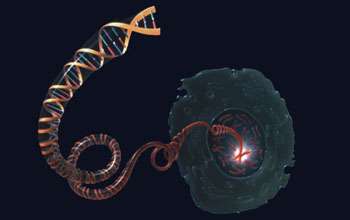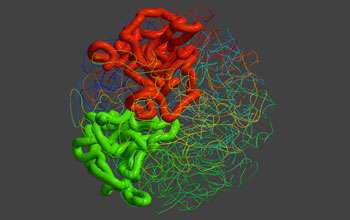Bacterial DNA may integrate into human genome more readily in tumor tissue

Bacterial DNA may integrate into the human genome more readily in tumors than in normal human tissue, according to a new study from the University of Maryland School of Medicine's Institute for Genome Sciences. Researchers analyzed genomic sequencing data available from the Human Genome Project, the 1,000 Genomes Project and The Cancer Genome Atlas (TCGA). They considered the phenomenon of lateral gene transfer (LGT), the transmission of genetic material between organisms in the absence of sex.
Scientists have already shown that bacteria can transfer DNA to the genome of an animal. The researchers at the University of Maryland Institute for Genome Sciences found evidence that lateral gene transfer is possible from bacteria to the cells of the human body, known as human somatic cells. They found the bacterial DNA was more likely to integrate in the genome in tumor samples than in normal, healthy somatic cells. The phenomenon might play a role in cancer and other diseases associated with DNA damage. The paper was published in PLOS Computational Biology on June 20.
"LGT from bacteria to animals was only described recently, and it is exciting to find that such transfers can be found in the genome of human somatic cells and particularly in cancer genomes," says Julie C. Dunning Hotopp, Ph.D., Assistant Professor of Microbiology and Immunology at the Institute for Genome Sciences (IGS) at the University of Maryland School of Medicine and lead author on the paper. Dr. Hotopp also is a research scientist with the University of Maryland Marlene and Stewart Greenebaum Cancer Center. "Studies applying this approach to additional cancer genome projects could be fruitful, leading us to a better understanding of the mechanisms of cancer."

In the research, a team of interdisciplinary scientists and bioinformatics researchers found that while only 63.5% of TCGA samples analyzed were from tumors, the tumor samples contained 99.9% of reads supporting bacterial integration. The data presented a compelling case that LGT occurs in the human somatic genome and that it could have an important role in cancer and other human diseases associated with mutations. It is possible that LGT mutations play a role in carcinogenesis, yet it is also possible that they could simply be passenger mutations.
The investigators suggest several competing ideas to explain the results, though more research is needed for definitive answers. One possibility is that the mutations are part of carcinogenesis, the process by which normal cells turn into cancer cells. Alternatively, tumor cells are so very rapidly proliferating that they may be more permissive to lateral gene transfer. It is also possible that the bacteria are causing these mutations because they benefit the bacteria.
The study was funded by the National Institutes of Health's Director's New Innovator Award Program (1-DP2-OD007372) and the NSF Microbial Sequencing Program (EF-0826732).
"This is the type of basic science research, conducted using the analysis of much publicly available genomic data, that makes us leaders in the cutting edge field of genomic science and personalized medicine," says E. Albert Reece, M.D., Ph.D., M.B.A., Vice President for Medical Affairs at the University of Maryland and the John Z. and Akiko K. Bowers Distinguished Professor and Dean of the University of Maryland School of Medicine. "It is just this type of research that will lead us to a new world of personalized medicine, in which doctors can use each patient's genomic make-up to determine care and preventive measures. We are excited to be a part of this future with the outstanding work of our Institute for Genome Sciences."

















